by Jenny Rose | Nov 2, 2017 | A Flourishing Woman, The Journey
In the Neopagan Wheel of the Year, Halloween is the modern secular version of Samhain (SOW-in), the last harvest festival, a time when the veil between the spirit and corporeal world is thin and we prepare for the peace and rest of winter. It’s a time to let go of that which no longer serves us.
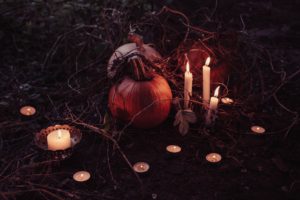
Photo by freestocks.org on Unsplash
This year Samhain was ushered in by the remains of Hurricane Phillippe, which battered Maine and other parts of the Northeast with high wind and heavy rain.
Wind is an old familiar of mine, as the place I came from in Colorado was extremely windy. There, the wind blows relentlessly for days and nights on end sometimes, a steady roar from one direction that fills the air with sand, grit, trash and other debris, frequently exceeding 60 mph and occasionally 70 mph. It’s the kind of wind nobody wants to go out in and it ground away at our nerves, making us feel housebound and irritable enough to climb the walls. It sucked all the moisture out of the ground, the plants and our skin. It tore roofs off sheds, blew down fences and trees, closed vulnerable highways and sent trampolines into the air.
The gale we had here this week was a different kind of wind. It came from all directions in gusts. It made the house groan and the trees thrash. It tore shingles off the roof and downed hundreds of trees. More than five inches of rain fell in billowing curtains. As a result, many thousands of people lost power, roads are blocked and it may be the end of the week before all the repair work is finished.
The storm hit us in the wee hours. We were awakened by an exploding power transformer somewhere close by, probably because of a fallen tree.
When I went out for my morning walk, I found change.
Several large trees have snapped off and lay or lean, the exposed raw wood pale and jagged. One less tree in a patch of thick forest is a subtle change to my eyes, but to the life surrounding it for several feet in every direction it’s a dramatic turn of events. It changes the light. It changes the nutrient demand underground. It feeds the mycelium and other organisms that will break down the wood. It gives new opportunity to young trees and other plants.
All the trees that came down on our land looked unhealthy, and several were rotting in place and collapsed rather than sheared off. Lots of dead branches tore away, too, and cones were flung far and wide.
As I walked, I reflected on change. Millions of people are experiencing unprecedented storms now. In just a few hours, whole lives are swept away by powers we cannot control. But the wind of change can also be a breeze, a zephyr we hardly notice, even if we practice daily presence with ourselves and our surroundings. Change is always with us, as inevitable as death.
More often than not, I fight with change. I don’t mind the idea of change, per se, but I want it to be on my terms. I want to control it. In my own life, though, change has often come unexpectedly and catastrophically, sometimes in the form of a seemingly insignificant moment in which I suddenly see. I suddenly assimilate a vital piece of information. A veil tears and I discern what lies behind it. In an instant, everything changes, and at the same time it doesn’t, at least not more than usual.
Yet I am changed, and I can never go back.
In a few days, things will normalize in Maine, but the landscape is altered now. It will never quite be the same again, although our experience was trivial compared to Texas, Puerto Rico and many other places.
Walking our boggy fields alongside the river, my old boots leaking at a split seam, it seemed to me the greatest gift of Samhain is the opportunity to allow wind and storm, to revel in them, to join power and energy with them, come what may in the aftermath. I stood watching the river, filled right to its brim, running muscular and turbid, crowded with tree debris and occasional trash. Several tree skeletons that had leaned on its banks were gone.
There can be a glorious sort of power in letting go, in spite of fear and resistance. I discovered that in Colorado. As I walked, it was still quite windy and wet, the landscape waterlogged and disheveled. Halfway through my walk I discovered a tick crawling on my hand, and a quick inspection of my head-to-toe canvas army supply rain cape revealed several more. I scraped off those I could see with a stick while I paused at my second river overlook to watch the water and then navigated a large old white spruce that had fallen across the mowed path and went home to do a lengthy and soggy tick check. The final count was 13, by the way.
Collaborating with a storm like this is good work for Samhain. I’m content. The forest has been culled and renewal will follow. New life will come into every space that was emptied. Our streets and roads, blocked with fallen trees and sagging power lines, look devastated rather than graceful and elegant. Thousands of people are managing without power. Yet the wind cleansed us of dead and dying life, whether or not we were ready or consented.
Now there’s no choice but to go on, to step into the diminishing light of winter, to face whatever the future brings, to replace what no longer serves with something more powerful. I want to leave you this week with a poem I wrote in October, 2012.
Wind
Come, wild wind, sweep across the sky and loosen the world!
Rise, wind, blow! I summon you with breath and breath again!
Blow, wind, roar! I command you from the center of loss!
Roar, wind, howl! Fling me open. Tear all the pretty things away.
Peel my lips from my teeth and flay me to pieces.
Lend your voice to mine and scream me into clean bones.
Scream!
Let us sever and rend together!
Strew the tatters of my dreams across stubbled fields and in dusty streets!
Rage, wind, exult!
You think you bend me to your will?
You take nothing I do not surrender.
You weaken and end before I do.
And when tumult has passed I will call myself home from wherever I am scattered.
I shall gather the rags of what has been and shape them into a sail and you shall fill it and take me onward.

Photo by Kelly Sikkema on Unsplash
All content on this site ©2017
Jennifer Rose
except where otherwise noted
by Jenny Rose | Oct 12, 2017 | A Flourishing Woman, The Journey
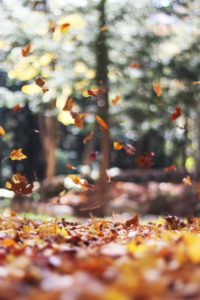
Photo by Autumn Mott on Unsplash
I love autumn, and autumn in New England is particularly poignantly beautiful. The leaves, oh the leaves! It’s as though the trees release their passion in one final gasp of ecstasy before their long sleep. The colors stun the senses with their beauty; it’s almost too much to absorb. Yet the trees’ splendor is fleeting. Inexorably, the leaves fall like golden tears, like blazing sparks, and as they fall the greatest power of all is revealed: The true shape of things.
The green and fiery sea of the forest and fields recedes. Lichen-covered rocks bare themselves. Trees stand or lean in bony beauty, gnarled and hollow, smooth and upright, each species clad in its own color and texture, but now the colors are russet and ivory, shades of brown and grey touched with black. Thorns and stems become semi-transparent cover for winter-colored birds and animals.
The bare forest is everything it is and nothing it is not.
I, too, am becoming reduced to my essential self. Confusion, guilt and shame are loosening their hold on me and drifting away, and I make a resting place for them in my writing. I look back in my memory and, for the first time, begin to see the true shape of things. All the words that weighed me down and kept me small, all the gaslighting and controlling, all the lies and distortions, are responding to some miraculous internal seasonal shift and slant of light. I am bursting into triumphant understanding, and then letting go, letting all that does not serve me fall away. My true shape emerges, and it’s strong and clear-seeing and wise. It always was.
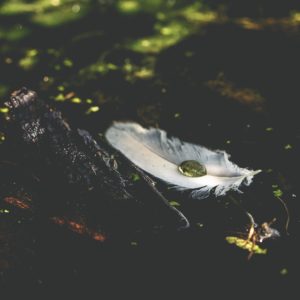
Photo by Erik Stine on Unsplash
Now I begin to see the true shape of things. Now begins a season without pretense, unencumbered by expectations. Now the lineaments of my feelings lie bare. The landscape of my life becomes stark and uncomplicated, a walk through winter woods where a feather is a feather, a quill a quill and a swatch of fur on a thorn exactly what it is, not more, not less, not something else entirely. I reclaim the dignity of my own perception, intuition and experience.
It does not surprise me that traditionally this is the time of year when the veil between the worlds thins, ghosts walk, legends come to life, ancestors are honored, and we acknowledge that which haunts us. I do not fear my ghosts. Indeed, they’re old friends and companions. My bogeymen were flesh and blood concealed beneath dazzling costumes of false power, fearful only as long as their true shape was hidden from me.
Some fear the fading light, endings and truth. Some prefer the riot of distraction and confusion. Some refuse to see or know the true shape of things. My own courage is not strengthened by distraction, no matter how beautiful or seductive. My courage is a thing of unadorned simplicity, spare and clean as bone.
The leaves fall, ravishing, rapturous. At last, the true shape of things emerges from the blaze, pure and indestructible, and I embrace it like a lover.
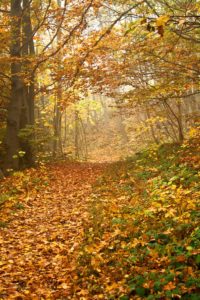
Photo by Vanessa von Wieding on Unsplash
All content on this site ©2017
Jennifer Rose
except where otherwise noted
by Jenny Rose | Aug 10, 2017 | A Flourishing Woman, The Journey

Photo by Andrew Montgomery on Unsplash
I often imagine life as a river and myself in a boat of my own making, floating on it. I don’t picture a sailboat, having no experience of one, but a small boat that glides with the current and can be paddled. I don’t imagine a single river, but a vast network, far more than I could ever explore in this lifetime. Sometimes it’s a river of water, sometimes a river of stars. Sometimes it’s a river of green moss carving a path through thick forest. Sometimes it’s an air-borne river of leaves and feathers and pieces of sky.
Sometimes it’s a river of stone.
The thing about rivers is they take me where they take me. I can paddle and steer, but whatever river I’m on at any given moment is a living thing in itself. I’m not its master and it doesn’t ask me where I want to go.
Of course, I don’t have to surrender to this kind of movement. I can refuse to make a boat in the first place, refuse to learn how, refuse to try. I can take a short cut and buy a premade boat or jump in someone else’s boat. If I do manage to create a boat, I can still make my way to the shore at any point and stop.
I can always throw myself out of the boat, too … but then I’ll never find out where the river is taking me.
I can also fight with the current.
I know a lot about this.
In the last few days, I’ve been floating on a river of stone.

Photo by Paul Van Cotthem on Unsplash
Stone is very, very, v…e…r…y slow. Oh, it moves, in the deep foundations of life. It shifts and compresses, slips, breaks down, heats and cools. It tells an old, old story, whole volumes of which are faded and weathered into illegibility, or hidden so well I know I’ll never read them. Now and then, though, a period of grace arrives in which I inadvertently enter a river of stone and have an opportunity, which I reject, avoid and try to escape, to hear whispers of stone stories.
During these times, others on the river are out of sight and out of hearing. My calls echo back to

Photo by Milada Vigerova on Unsplash
me off stone canyons and cliffs. I reach out for another in my sleep and wake with bloody knuckles. On the river of stone others do not respond. They don’t follow through. They don’t keep their word. My password doesn’t work. I can’t log on. There is no clarification or confirmation. I’m alone, in my little boat, and I feel adrift and forgotten, unseen and unheard, left behind.
The river of stone tells me a story of foundations, of beginnings, of layers of time and events, of family and tribe. My agenda, my insistence on movement and progress, my puny frustration with things not done, make less impression than a fragile-winged dragonfly that flung itself into the stone’s embrace uncounted aeons ago and flies now forever in the river of stone.
The river of stone is inexorable. It forces me to slow down. It provides me with no distraction and no easy entertainment. Creativity falls into sleep from which I cannot wake it. Those tasks and activities I call “productive” cease. Frantically, I paddle my boat, one side, then the other, until my hands are bloody blistered and my shoulders are a block of pain. All the old demons in my head leap into life, jeering and heckling, joining hands in gleeful celebration, and they have their way with me because I’m trapped in a river of stone.
I accomplish nothing on a list. I write no pages. Plans fall through. I wait too long to walk, and then it rains. Dirty dishes sit on the counter. All I want to do is get lost in an old familiar book — if only I could stay awake long enough!
Then, gradually, frustration, panic and fear exhaust themselves and lie down to rest. I rediscover the beauty of emptiness. I begin to see veins and gems and stardust in the stone around me. I remember the difference between doing and being, and the delicate balance they must maintain. The stone speaks to me of strength, of endurance, of centering and grounding. I give myself to the pause in communication and creative work. I put down the paddle, the oar, stretch out in the boat and rest, dreaming of stone-lipped wells refilling with spring water, dreaming of a spray of words leaping off waves or trailing behind stars in a river ahead, dreaming of friends whose faces I haven’t yet seen and broken connection repaired.
I doze, rocked in a cradle of stone. I rest, floating on a river of rock. I sink into the slow, deep, stony heartbeat in the center of all things, imagine inhalations and exhalations, each lasting 100,000 years.
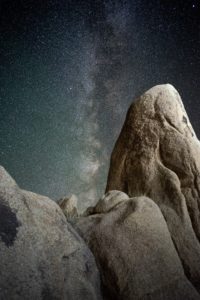
Photo by Brent Cox on Unsplash
I surrender to the river of stone, and in doing so I float out of it.
All content on this site ©2017
Jennifer Rose
except where otherwise noted
by Jenny Rose | Aug 3, 2017 | A Flourishing Woman, The Journey
I’ve been blogging now for a year.

Photo by Markus Spiske on Unsplash
I remember the first time I stood on a high diving board as a kid. The safe haven of the water was impossibly far away. I did eventually jump, but I stood, hesitating, for a long time.
Beginning to blog was like that. Could I manage the technological learning curve? Would I have time to do a good job? Did I have anything to say? Would I have to deal with spammers, hackers, hecklers and hate mail? Would anyone read it? And, the biggest Boogeyman of all, what would people think when I revealed who I really am?
I researched. I read dozens of articles on blogging. I made lists of do’s and don’ts. I bought a book on blogging.
I hesitated. I worried. I doubted myself. I clung to limits, obstacles and fears.
Then, in the middle of a personal and emotional catastrophe, the very last time I would have chosen or planned such a risky, frightening new endeavor, I suddenly started. I suppose I felt I had nothing more to lose.
This summer I’ve been taking stock of what I’ve created, what I’ve learned, my long list of mistakes and my intentions for the future. I’ve been a member of She Writes and Medium. I follow several other bloggers. I went into my Favorites and deleted most of my Blogging folder and then started filling it up again with new articles on Intermediate blogging.
There are hundreds, if not thousands of articles about blogging on the web. What I notice is 19 out of 20 are geared to successful blogging, which is to say blogging with the most possible likes, looks, shares, clicks, referrers, subscribers, advertising and side bar businesses, all of which can translate directly into income for the blogger. The Holy Grail is to go viral with your blog. To this end, the advice is repetitive. Use sentences of five words or less. Use short paragraphs of two or three sentences. Use lots of images, video, bullet points, colors, fonts and section titles. Keep your posts short and to the point. Carefully construct a title that will result in as many clicks as possible. Convince the reader you have something of value they need. Don’t be emotional or personal. You can’t be successful unless you have several active social media accounts.
I read, saved, took a few notes, and then realized I didn’t want to do most of what these articles said I should do. I paused and thought about that for a couple of days. I looked at my stats. I talked with my partner. I groped for a bottom line.
I absolutely love blogging/writing.
Why?
Because when I do it I’m real. Every single week I write about something real. Most weeks I struggle with what other people might think, but at the end of the struggle I again choose to be seen. I stare down that fear of using my voice and speaking up. I’m taking my power back, week by week, post by post, line by line.
Blogging and writing are my way of building bridges and fostering connection, to myself, to others, and to life. It’s the medicine I can offer to aid in healing. It’s my hug, my love letter to the world, my kiss of peace. It’s my outstretched hand, regardless of whether or not others choose to clasp it, ignore it or spit on it.

Photo by Alona Kraft on Unsplash
My feeling of success about writing a book and creating a blog isn’t attached to any of the general markers of success among bloggers. We have all kinds of programs that help us gather statistics on the web, but my heart doesn’t thrill to hundreds of clicks or fall if there are only five. None of these stats tell me anything about the quality of my contribution to my readers, and that’s the only stat that interests me. I don’t have anything to sell you. I don’t assume I have anything of value to you. I never expected to make money on my blog.
I just am. Myself is all I have to give, and what I really want from you is just … you.
I’ve been honored to achieve simple connection with others through Our Daily Crime. Some I know about, because people comment. I may be making other connections that remain invisible to me. Contrary to the best advice, I don’t have social media accounts. I don’t have a Facebook page. If a reader connects with my words or finds some kind of value in the experience I share and doesn’t comment or email me, I don’t know anything about it, but I have faith. I believe there are others out there who think about relationships, empowerment, being a woman, and what it means to be alive on Earth today. I believe there are readers who can deal with sentences more complex than five words and read a paragraph of several sentences. I think a post about rules for success should be titled, clearly and honestly, Rules For Success. I’m not a click bait engineer.
I don’t regret a minute of research or reading I’ve done about writing and blogging, and I wish those writing advice the success they seek. They’ve helped, especially their content that I couldn’t use. All those rules set off a lot of feelings. I hardly ever met a rule I didn’t want to challenge, and my feelings showed me the way into my own definition of success.
I find it useful to have goals and intentions, to know what kind of outcome I want, but the fact is I don’t always know. Some things are so unknown and such a personal leap of courage or faith that to insist on exactly defined goals before beginning is to never take action. Jumping inelegantly off the high dive into blogging was all I could manage last summer. I couldn’t define an audience, a goal or an intention, except that I was damned if I would let fear stop me from trying. It’s only now, 50 posts later, that I begin to understand what I’m up to, and it’s not necessarily the same as what other bloggers are up to.
Here’s my favorite story about success. This version is from One Bird One Stone by Sean Murphy.
For 40 years, a fisherman in China used a straight needle to fish. When someone asked him, “Why don’t you use a bent hook to fish with?” he replied, “You can catch ordinary fish with a bent hook, but I will catch an extraordinary fish with my straight needle.”
Word of this came to the ear of the Emperor, and he went to see this fool of a fisherman for himself. Laughing at the sight of the fisherman’s straight pin, the Emperor asked, “What are you fishing for?”
The fisherman said, “I’m fishing for you, Emperor.”

Photo by Steinar Engeland on Unsplash
Thank you for reading my blog. You’ve helped make it a success.
All content on this site ©2017
Jennifer Rose
except where otherwise noted
by Jenny Rose | May 25, 2017 | A Flourishing Woman, The Journey
In old stories, a crossroad is always a magical place of power and choice. You never know who you might meet at a crossroad. Perhaps a lean, handsome peddler will draw up a cart and spread his wares. Other travelers may appear. Elders may linger there with wisdom under their tongues. Crossroads are not always identified by neat, straightforward lettered signs, but portents, omens and intuitive signs abound. A dismally croaking raven, a snake in the dust or a fleeting glimpse of a fox all have a message at a crossroad.
I rarely miss posting weekly, but last week I did. I succumbed to a virulent upper respiratory virus and for a few days had no choice but to down tools and lie low. Simply breathing occupied all my attention and energy. I cancelled plans and obligations, abandoned my ‘to accomplish’ list and let go of my self-expectations.
This was frustrating, as it was the week in which I intended to transition effortlessly from my old job to new possibilities, witness the smooth closing of the sale of my property in Colorado, and generally navigate these significant endings and beginnings seamlessly, elegantly, confidently and without mess.
Instead, I emptied two boxes of Kleenex, coughed as though ready for an end-stage TB ward, achieved a spectacularly sore and chapped mouth and nose, drank liters of fluid with the inevitable day and night result of continually needing to pee, and tried to sleep in a sitting position to facilitate breathing through my clogged airway.
Instead of transitioning smoothly into new work, I canceled one opportunity and didn’t follow up on others. I worried about money instead.
The sale of my house did occur, but a day late due to unexpected last minute paperwork that needed to be signed and notarized and sent from Maine back to Colorado. My renters have been unable to find a new place, the buyer (now owner) is moving into a trailer because her old house also sold and her new house still has renters in it, and I need urgently to return to Colorado and retrieve the rest of my possessions from the property.
In short, nothing about my internal, physical or external reality has been seamless, elegant, confident or without mess. In fact, there’s been quite a bit of mess, from sodden Kleenex to tangled feelings.

Photo by Jeremy Bishop on Unsplash
None of this really surprised me. I’ve never yet been really miserably ill without a significant emotional event of some kind at the onset. I might not admit my distress intellectually, but the truth will out physically. Unacknowledged feelings eventually reach such proportions they demand my attention, one way or the other. All of my pretty plans didn’t allow for any space in which to pause, reflect, feel and be with how things are.
So, I got sick.
I resigned myself to the inevitable, did what I could for my symptoms, reread all my old Mary Stewart books (so comforting, and no brain required), dozed, and thought about intersections, endings and beginnings, suspended activity and crossroads.
I have a tendency to view my experience through a lens of metaphor and symbol, and suspended activity has been much in my mind for the last five years. The Hanged Man is a Tarot card with just that meaning, and my first book is named after it.
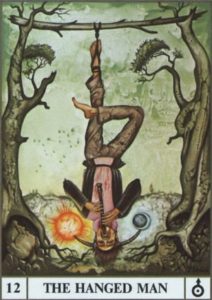
The Hanged Man is a card many people fear, although generally the figure depicted hangs upside down from one leg, apparently perfectly relaxed and comfortable and even smiling, depending on the deck. The card illustrates that place in life we’re all familiar with between one thing and another, just like the crossroad. Events converge and intersect. Meetings and partings take place. We suddenly come to the end of a road and it’s necessary to choose a new one.
I’ve never been good at pausing. I can accept change, but I expect myself to adjust and adapt instantly and effortlessly, no pause required. I don’t want to hang around (if you’ll pardon the pun) and think about what’s over or what I’d like to begin. I want to get a grip and move on. Now!
This is a shame, and all the old stories and archetypes tell us it’s counterproductive. Crossroads are sacred ground, filled with resting places, old altars and tilted gravestones. The leaves on trees growing at crossroads whisper all the prayers and petitions they’ve heard. At crossroads we lay out cards, cast runes and yarrow stalks, interpret dreams, drum, dance and call on our intuition and faith for guidance. A crossroad is a place to linger, honoring where we’ve been and considering a way forward, or sideways, or perhaps even retracing our steps for a second time before we go on.

Photo by Ryan Moreno on Unsplash
A crossroad deserves an offering of our presence and patience. It’s only in suspended activity that we access our deepest intuition and wisdom, only then when we begin to gain full understanding. Loss takes time to put to rest. Hopes and dreams need time to grow. Intuition can’t speak unless we’re quiet, and guidance can’t find us if we’re not still.
I’m writing this out on our deck in the sun. I can hear water running into the pond. The phoebe, back for another summer, is perched in her favorite spot on the barn roof, bobbing her tail and hunting for insects. Wonder of wonders, there’s not a box of Kleenex at my elbow! Not only that, but I’m breathing through my nose. Things are looking up.
Before me is a new week. I’ve sort of given up on the seamless and elegant thing. It hasn’t been fun to be sick, but I’m grateful I was forced to pause. I didn’t feel like I was doing anything except wasting time and blowing my nose, but I see now I needed to hang by one leg and just be for a little while. I needed to consider what’s ending, and how I feel about it, and what direction I want to go now. I needed to spend some time wandering in my graveyard, remembering what’s laid to rest there. It was important to revisit my hopes and dreams, check in with my intuition and take time to wonder what will happen next.
At this point I’ve decided to be content with lingering at this crossroad. When it’s time to go on from here, I’ll know. In the meantime, this is a good place. Maybe a peddler is even now on his way to meet me, or an old crone in a hooded cloak will come in the dark morning hours with an enigmatic message showing me the way forward. Who knows?
Now that this is written, perhaps I’ll go find the tree from which the Hanged Man is suspended and see what’s on his mind today.
All content on this site ©2017
Jennifer Rose
except where otherwise noted
by Jenny Rose | Mar 23, 2017 | A Flourishing Woman, The Journey
When I came to Maine from Colorado, I left behind a small log house on four lots in a mountain town of about 1,000 people. I was fortunate enough to find good renters. I’d never been a landlady before, but the prospect of renting was less overwhelming than actually trying to sell the house while making the huge transition to Maine.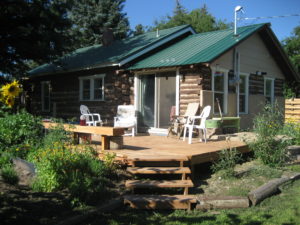
My childhood consisted of moving from here to there frequently, and the constant upheaval and insecurity was hard. I didn’t really make friends or invest in any particular place, because I never knew when we would have to pack up and go again. By the time I was a teenager, my family had settled down, but by then I was getting ready to go out into the world and make a place of my own, so there still wasn’t any security.
Then I got married and had children, and finding a home was largely driven by my husband’s wants and preferences and what our young family needed, not by my own desires. It became apparent over my years of marriage that the house that appealed to me and the house that appealed to my husband were rather different in terms of location, style and layout. We moved from place to place, and I made do wherever we were — a skill I had a lot of practice with. It was the family that mattered, I told myself, not the house.
When the boys were ready for school, though, it was important to me to settle down somewhere, as I didn’t want them to have the experience I did of always being the new kid in school. At that point we moved to the little town referred to above, where I stayed for more than 20 years. The house we bought when we moved there sheltered us, along with dogs and cats, but I never really liked it. Once again, it had been my husband’s choice.
Fifteen years passed and I found myself alone with a cat in a big house I’d never loved that hijacked me with ghosts and memories everywhere I turned.
I sold the house, discarded a lot of stuff and, after a couple years of searching, heard of a dilapidated old log house that had been rented that was about to go on the market. One of my friends was a neighbor, and one spring morning we went to walk around it.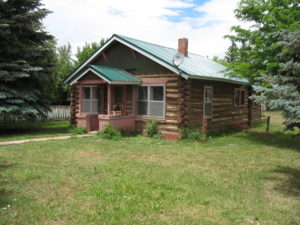
It needed a lot of work, but I was charmed. My friend went up 3 cement steps in the back, found the back door open, and we walked in.
It was outdated, tiny, inconvenient and badly neglected. Everything, inside and outside, was frayed, ragged, used up, dusty and dirty.
Falling in love is a strange thing. What is the complex, mysterious response a person, object or place calls from us? It’s got nothing to do with beauty or even suitability, that’s for sure, at least not for me.
I felt akin to the house. There it sat, and had been sitting for over 100 years, on a weedy and trash-filled patch of ground with large old trees around it, unloved, unseen and unappreciated. It was small and ugly and shabby. I myself had never noticed it in all my 15 years in that town.
Nobody loved or wanted it.
That’s what captured my heart.
Nobody loved it.
But what if somebody did? What if somebody wanted it, cleaned it up, gave it some care and attention?
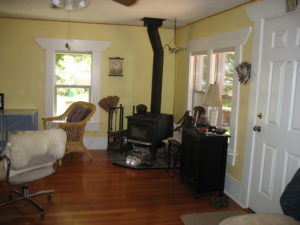 So I bought it, remodeled one end, gave it new windows and a new front door. I had the wood floors stripped, sanded and sealed. I insulated, put in a little wood stove, patched and painted. I raked up bags and bags of trash and built garden beds out of cardboard, newspaper, huge loads of manure and fill dirt, moldy straw and hay and compost. I hung birdfeeders and wind chimes in the trees.
So I bought it, remodeled one end, gave it new windows and a new front door. I had the wood floors stripped, sanded and sealed. I insulated, put in a little wood stove, patched and painted. I raked up bags and bags of trash and built garden beds out of cardboard, newspaper, huge loads of manure and fill dirt, moldy straw and hay and compost. I hung birdfeeders and wind chimes in the trees.
I didn’t know it then, but in loving that house and bringing it back to life, I was taking the first steps in loving myself, and eventually leaving that little town for a bigger, wider world.
I lived in the house for five years, and I was struck, over and over again, by how the house and land responded to every bit of attention I gave them. They never shrank away from me. I never failed or disappointed. The place blossomed. It bloomed. The garden grew. The trees filled with birds. Sunlight poured in the new windows and turned the old floor to the color of honey. Indoor plants throve on the wide windowsills.
The house was like a mirror. It reflected back to me creativity, color, light, modest luxury, simplicity. As I lived my life in it I saw myself differently than I ever had before. I had made a beautiful place, peaceful and welcoming.
For the first time, I thought maybe I had something to offer the world. Maybe I was of some use after all.
In my head, it was all settled. After nearly 50 years of moving and being subject to someone else’s needs and choices, I had come home. For the first time in my life I allowed myself to put down deep, deep roots. I filled the house with my music, my books, my spiritual work, my art, my hopes, dreams, desires, fears and griefs. I joyfully lived without clutter, piles, and collections of junk that weren’t mine. I burned candles and incense and had flowers by the kitchen sink and in the bathroom.
Never again would I have to move. I was safe. I laid in bed at night and felt the house around me like sheltering wings. I had at last realized the deepest and most painful desire of my life — a real home. I would live the rest of my days in safety, serenity and security. The house and I belonged to each other and took care of one another.
Last month I put the house up for sale, and last week it went under contract.
I don’t know how to express all the thoughts and feelings that led me from that place to this. To say I emotionally outgrew it feels true. To say my old life began to feel much too small is also true. Gradually, I understood a house can’t provide me with the safety I’m always looking for, after all. I thought I’d reached the highest peak of my own desire and possibility, but when I got there and looked around, I began to see higher peaks still.
I’d created a home and called it a life.
I was also aware my love for the house exceeded my love for myself. Part of me still waited for someone to show up and do for me what I did for the house. Inside me, a sweet maiden stayed powerless and waiting for a prince on a white horse, but I wasn’t a maiden. I was a menopausal woman, expert in the art of pleasing people, with two adult children, two divorces and a history of abuse. It was too late for the prince thing, and I was bored by it anyway. What was a downy-faced idiot prince going to do with a woman like me?
I recognized the more mature (ahem!) parts of me were simply lonely for healthy, meaningful connection with other people, and no house, no matter how beautiful, comfortable or beloved, could give me that.
Then there was the anguished voice from deep inside, imprisoned somewhere behind my rib cage, that kept saying “I can do more than this! I can be more than this!”
Anyway, I chose to leave Colorado, the house and my life there, though it was like tearing myself in half. Still, I’ve never regretted that choice, and I know now that I don’t want to go back to my old life and that little town — even if I could.
The house I’m in now hardly notices me. It needs nothing from me, and nothing I can do will fix all that needs fixing and update all that needs updating. This is frustrating, at times infuriating, and oddly peaceful. All the energy and love I used to give my home is now going into my writing and into shaping myself and a new kind of life. In a strange and convoluted way, leaving the home of my dreams has at last brought me into direct, intentional and mindful relationship with…me.
I wonder if perhaps I’m the home and safety I’ve always been searching for. How ironic.
I’ve been weeping on and off as I let go of my house. I want to do it, and it hurts. I wonder if I’ll ever have that again — such a perfect home. I wonder about the new owner, who is also a single woman. I hope she feels as sheltered and nurtured there as I did. I hope she’ll touch the trees and feed the birds and glory in the iris and roses and clematis. I hope the owls will wake her in the deep winter nights, calling from the huge pine trees in front. I hope she draws close to herself as she sits in the sun where I sat, sleeps under the ceiling I had patched and painted myself, feeds the wood stove, washes dishes and relaxes in the bathtub.
I hope she and the house will love one another and be happy together.
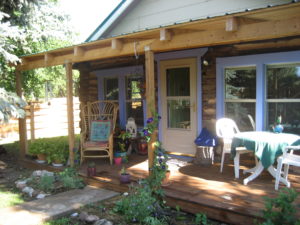
All content on this site ©2017
Jennifer Rose
except where otherwise noted



















